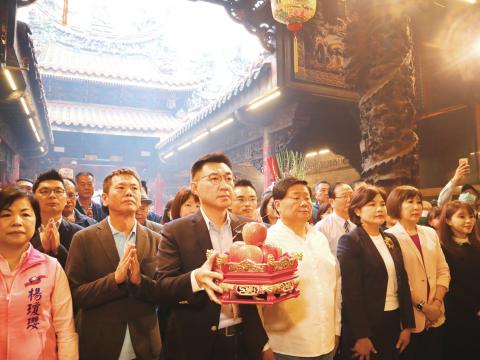It is “not necessarily a bad thing” that newly elected Chinese Nationalist Party (KMT) Chairman Johnny Chiang (江啟臣) has not yet received a congratulatory telegram from Beijing, a KMT legislator who asked to remain anonymous said yesterday.
Chiang was elected chairman on Saturday in a by-election in which he received 84,860 votes to beat his sole opponent, former Taipei mayor Hau Lung-bin (郝龍斌), who received 38,483 votes.
In the past, the Chinese president — in his capacity as chairman of the Chinese Communist Party (CCP) — would send a congratulatory telegram whenever a KMT chairperson was elected, the KMT legislator said.

Photo: Ou Su-mei, Taipei Times
However, not receiving a telegram from Chinese President Xi Jinping (習近平) was “not necessarily a bad thing” for Chiang, as it meant the outcome of the chairperson election would more likely have the support of Taiwanese, the legislator said.
The party should focus on reform and should be more “localized,” the legislator said.
China’s Taiwan Affairs Office on Saturday acknowledged the election of Chiang in a news release issued by Zhu Fenglian (朱鳳蓮), deputy director of the office’s news department.
The office hoped that Chiang would “cherish and protect the mutual trust between the CPP and the KMT on the foundation of the 1992 consensus,” the statement said.
It called on Chiang to “actively promote the peaceful development of cross-strait relations, and advance the interests and well-being of the people on both sides of the Taiwan Strait.”
During a policy debate prior to the election, Chiang had said he felt that the “1992 consensus” was “a little bit outdated.”
The so-called “1992 consensus,” a term former Mainland Affairs Council chairman Su Chi (蘇起) in 2006 admitted making up in 2000, refers to a tacit understanding between the KMT and the Chinese government that both sides of the Strait acknowledge there is “one China,” with each side having its own interpretation of what “China” means.
Chiang yesterday said that not receiving a telegram from Xi would not affect his promotion of reforms.
“Perhaps my election will not only give Taiwanese a new concept of things, but will also do the same for those in the mainland,” he said.
Separately, KMT caucus convener Lin Wei-chou (林為洲) yesterday said that he expects better cooperation between KMT headquarters and the party’s caucus following Chiang’s election.
The party would ensure there is a certain ratio of city and county officials in the KMT Central Standing Committee so that it is in touch with popular will, he said, adding that he also expects better communication between the KMT and other parties.
Meanwhile, the Democratic Progressive Party yesterday released a statement congratulating Chiang.
“We expect the new KMT chairman, Chiang, to open up a new era... People look forward to good interaction and cooperation between the ruling party and opposition parties, and for them to work together to advance Taiwan’s democracy and achieve major reforms that benefit the nation,” it said.
New Power Party Chairman Hsu Yung-ming (徐永明), who was a former colleague of Chiang’s at Soochow University, also passed on his congratulations.
Additional reporting by Chung Li-hua and Jason Pan

US climber Alex Honnold is to attempt to scale Taipei 101 without a rope and harness in a live Netflix special on Jan. 24, the streaming platform announced on Wednesday. Accounting for the time difference, the two-hour broadcast of Honnold’s climb, called Skyscraper Live, is to air on Jan. 23 in the US, Netflix said in a statement. Honnold, 40, was the first person ever to free solo climb the 900m El Capitan rock formation in Yosemite National Park — a feat that was recorded and later made into the 2018 documentary film Free Solo. Netflix previewed Skyscraper Live in October, after videos

NUMBERS IMBALANCE: More than 4 million Taiwanese have visited China this year, while only about half a million Chinese have visited here Beijing has yet to respond to Taiwan’s requests for negotiation over matters related to the recovery of cross-strait tourism, the Tourism Administration said yesterday. Taiwan’s tourism authority issued the statement after Chinese-language daily the China Times reported yesterday that the government’s policy of banning group tours to China does not stop Taiwanese from visiting the country. As of October, more than 4.2 million had traveled to China this year, exceeding last year. Beijing estimated the number of Taiwanese tourists in China could reach 4.5 million this year. By contrast, only 500,000 Chinese tourists are expected in Taiwan, the report said. The report

Temperatures are forecast to drop steadily as a continental cold air mass moves across Taiwan, with some areas also likely to see heavy rainfall, the Central Weather Administration (CWA) said. From today through early tomorrow, a cold air mass would keep temperatures low across central and northern Taiwan, and the eastern half of Taiwan proper, with isolated brief showers forecast along Keelung’s north coast, Taipei and New Taipei City’s mountainous areas and eastern Taiwan, it said. Lows of 11°C to 15°C are forecast in central and northern Taiwan, Yilan County, and the outlying Kinmen and Lienchiang (Matsu) counties, and 14°C to 17°C

STEERING FAILURE: The first boat of its class is experiencing teething issues as it readies for acceptance by the navy, according to a recent story about rudder failure The Hai Kun (海鯤), the nation’s first locally built submarine, allegedly suffered a total failure of stern hydraulic systems during the second round of sea acceptance trials on June 26, and sailors were forced to manually operate the X-rudder to turn the submarine and return to port, news Web site Mirror Daily reported yesterday. The report said that tugboats following the Hai Kun assisted the submarine in avoiding collisions with other ships due to the X-rudder malfunctioning. At the time of the report, the submarine had completed its trials and was scheduled to begin diving and surfacing tests in shallow areas. The X-rudder,